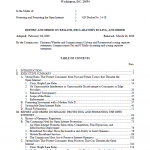
The open Internet drives the American economy and serves, every day, as a critical tool for America’s citizens to conduct commerce, communicate, educate, entertain, and engage in the world around them. The benefits of an open Internet are undisputed. But it must remain open: open for commerce, innovation, and speech; open for consumers and for the innovation created by applications developers and content companies; and open for expansion and investment by America’s broadband providers. For over a decade, the Commission has been committed to protecting and promoting an open Internet.
